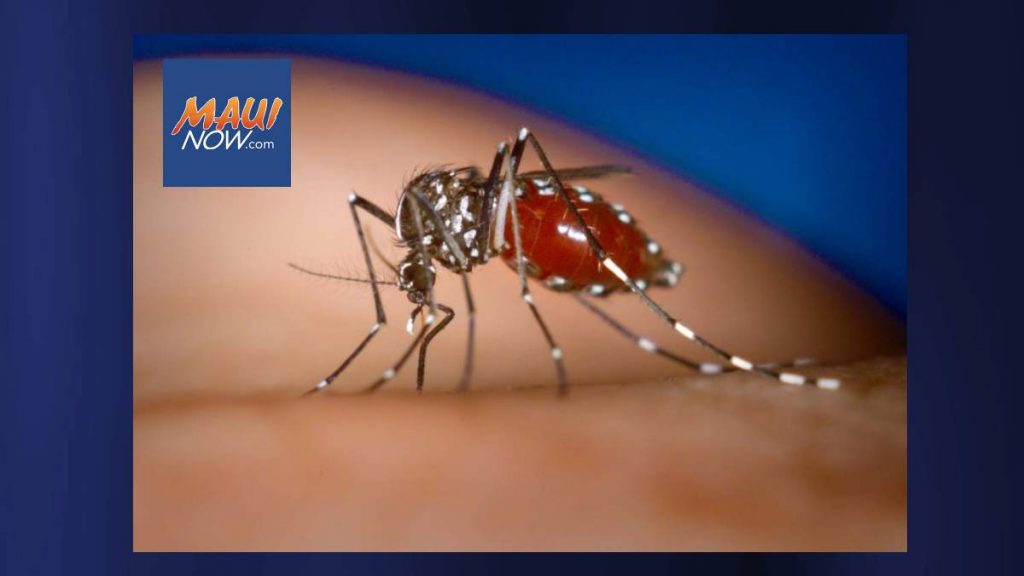Travel-related dengue case confirmed on Maui | Maui Now

The Hawai‘i Department of Health has confirmed a travel-related dengue virus case in Hāna, on the island of Maui. Upon investigation, DOH found conditions that could increase the risk of transmission. Vector control teams are responding and will continue to be active in the area.
Of the 10 dengue cases reported in Hawaiʻi since Jan. 1, 2024 to the present, five had traveled to Central or South America and five had traveled to Asia.
The public is urged to take additional precautions to protect themselves from mosquito bites and to stop mosquitoes from breeding.
The area where the case was reported experiences high traffic of visitors and tourists. Highly dense populations of mosquitoes were identified around the residence where the case was found and the surrounding area. DOH will continue to monitor mosquito numbers in this area and take additional measures as needed.
The DOH seeks your help in minimizing the risk of dengue transmission. Residents, visitors and businesses can take the following actions to reduce the risk:
- Apply mosquito repellent on exposed skin, especially if outdoors. Repellent should be registered with the Environmental Protection Agency and contain 20-30% DEET (active ingredient). Other alternative active ingredients may include picaridin, oil of lemon eucalyptus, or IR3535. To find the insect repellent that is right for you, visit the EPA’s website at https://www.epa.gov/insect-repellents/find-insect-repellent-right-you.
- Wear loose-fitting clothes (long sleeves and pants) that covers your skin.
- Keep mosquitoes out of your home or business by keeping doors closed or screens in good repair.
- Eliminate potential breeding sites by dumping out any standing water in or around your residence or business. This includes getting rid of rainwater collected in buckets, flowerpots, used tires or even plants such as bromeliads.
Symptoms of dengue typically may be mild or severe and include fever, nausea, vomiting, rash and body aches. Symptoms typically last two to seven days and although severe and even life-threatening illness can occur, most people could recover after about a week. If you are experiencing any of the symptoms listed above, see your doctor or heath care provider and inform them that you were in an area where a case of dengue virus was confirmed.
Dengue virus is spread from infected person to person through a mosquito bite. While Hawaiʻi is home to the type of mosquitoes that can carry dengue, the disease is not endemic (established) here in the state.
Anyone who travels to an area with dengue is at risk for infection. Currently, the Centers for Disease Control and Prevention advises travelers to practice usual precautions when traveling to areas of dengue risk. This includes using an EPA-registered insect repellent, wearing long-sleeved shirts and long pants when outdoors, and sleeping in an air-conditioned room or room with properly fitted window screens or under an insecticide-treated bed net. Some countries are reporting increased numbers of cases, so it is important, four to six weeks before you travel, to review country-specific travel information for the most up-to-date guidance on dengue risk and prevention measures for that country. Travelers returning from an area with risk of dengue should take steps to prevent mosquito bites for three weeks — and if symptoms of dengue develop within two weeks upon return, should seek medical evaluation.
For more information, visit the Disease Outbreak Control Division website and Vector Control Branch website.
Related
Turkish Airlines and Qatar Airways Suspend Mogadishu Flights Following US…
Home » Airlines News of Qatar » Turkish Airlines and Qatar Airways Suspend Mogadishu Flights Following US Embassy Terror Alert, Raising Security Concerns at
Local tourism destinations grow fast
Men sit at the Doha Corniche backdropped by high buildings in Doha on March 3, 2025. Photo by KARIM JAAFAR / AFP DOHA: Local tourism destinations are g
Hajj, Umrah service: Qatar Airways introduces off-airport check-in for pilgrims
Image credit: Supplied Qatar Airways has introduced an off-airport check-in
IAG, Qatar Airways, Riyadh Air, Turkish Airlines, Lufthansa & more…
Turkish Airlines – a Corporate Partner of the FTE Digital, Innovation & Startup Hub – is charting a course to rank among the top 3 global airlines for












